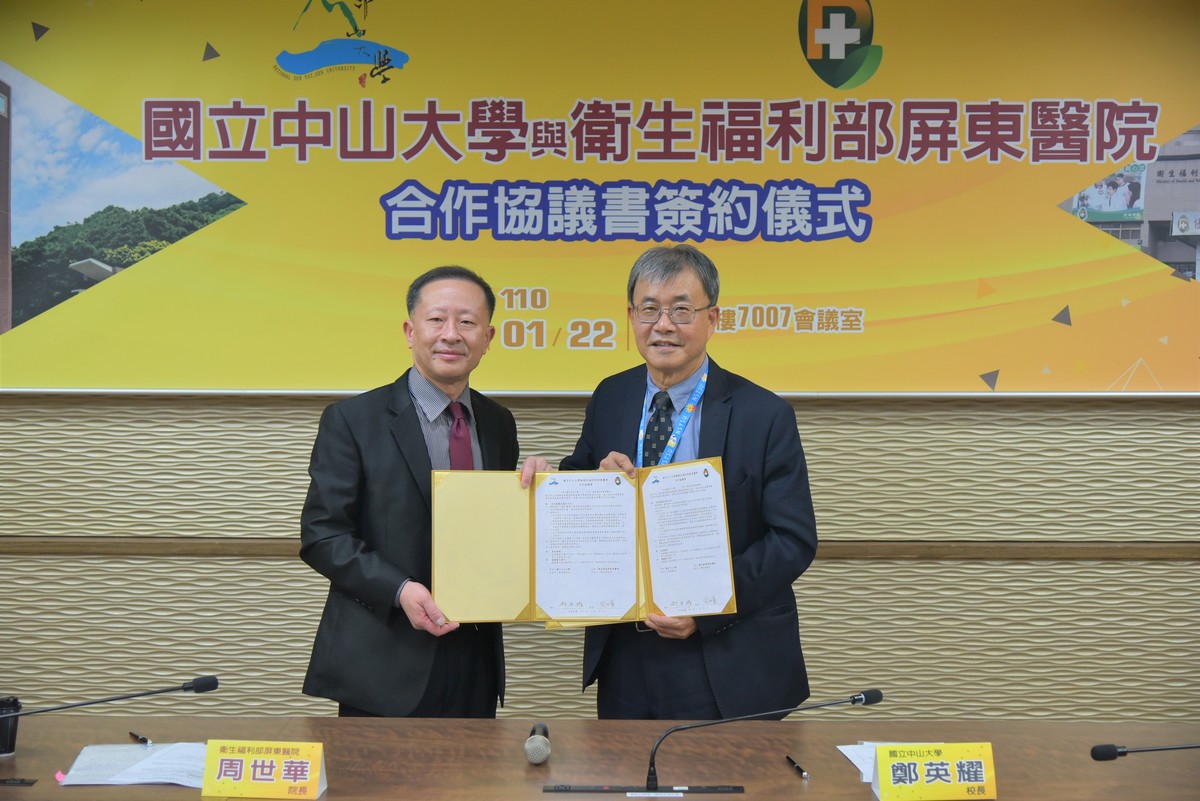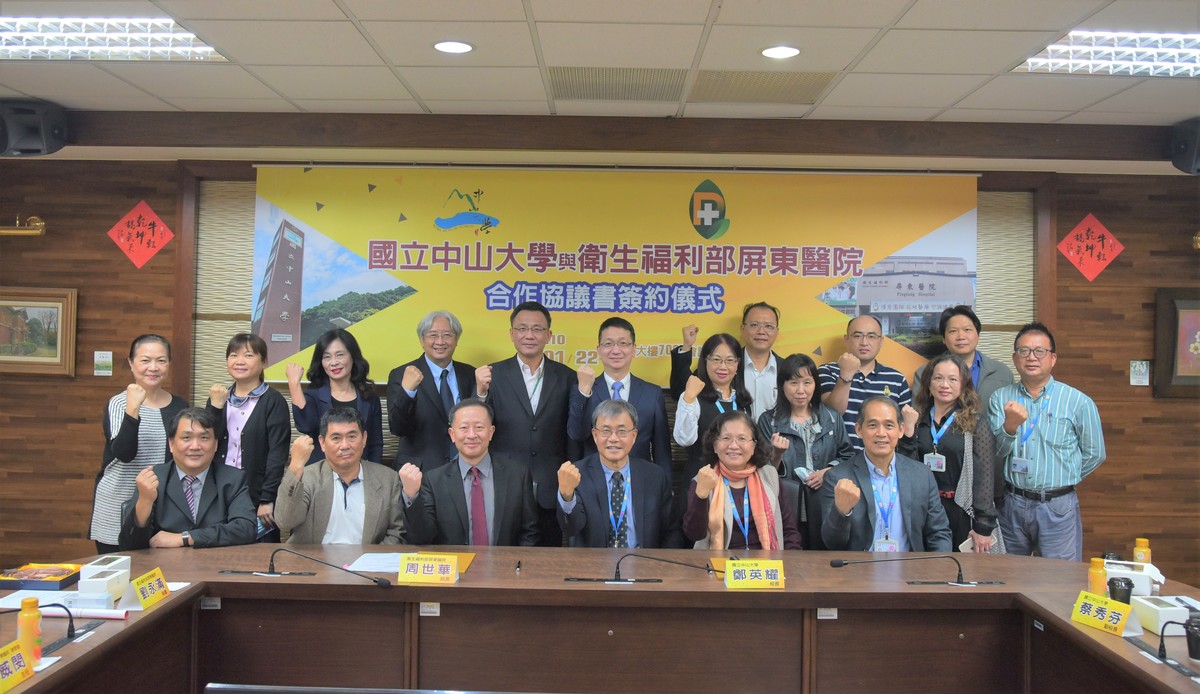NSYSU signs cooperation agreement with Pingtung Hospital


2021-01-29
As the pandemic grows more severe, National Sun Yat-sen University signed a cooperation agreement with Pingtung Hospital, Ministry of Health and Welfare. Both NSYSU President Ying-Yao Cheng and Superintendent of Pingtung Hospital Shah-Hwa Chou pointed out that caring for the disadvantaged and responding to national policies are responsibilities of public universities and public hospitals and that in the future, with the School of Post-Baccalaureate Medicine established, both parties will cultivate medical professionals to work in rural areas to balance out urban and rural healthcare resources and strive for justice in healthcare.
According to the statistics of the Department of Household Registration, Ministry of the Interior, in 2018, the ratio of population aged 65 and above has surpassed 14.6% and thus Taiwan has become an aging country. In 2019, according to the statistics of the Department of Civil Affairs of Pingtung County Government, the population of Pingtung County is a truly "elderly society”, with the elderly population reaching 140,000 and accounting for 17% of the total population of over 820,000. The elderly also account for the majority (59%) of the patients of Pingtung Hospital, which shows the need for medical treatment and care of the elderly population in Pingtung.
“Pingtung Hospital is the largest public hospital in Pingtung County and the only hospital responding to infectious diseases in the Kaohsiung-Pingtung area.” NSYSU President Ying-Yao Cheng emphasized that in the future, should any large-scale epidemic occur, NSYSU will provide first-line medical professionals and the newest medical technologies to improve the quality of healthcare services for the benefit of the residents of the Pingtung area. The COVID-19 pandemic is now putting pressure on medical personnel and the hospital space in various counties and cities. The team of the Department of Electrical Engineering developed the Self-Injection-Locked Radar, 100 times more sensitive than the traditional radar, and combined it with infrared thermal image technology to develop a contactless biological sensing system to timely monitor patients’ heartbeat, respiration, and body temperature. It can be applied in cloud health management, and care systems for the elderly and infants. The Radar helps monitor patients’ health remotely, reducing the risk of cross-contagion.
Senior Vice President of NSYSU Shiow-Fon Tsay further pointed out that the Rapid Screening Research Center for Toxicology and Biomedicine (RSRCTB) at NSYSU developed the mass spectrometry to detect toxins or drugs on patient’s skin in one minute and succeed in applying this technology in clinical and toxicological treatment. In addition, it can quickly detect drug use and medication abuse to assist individuals in detoxification. In the future, the radar can help detect new viruses, such as SARS-CoV-2, to speed up the virus detection process and improve its effectiveness.
Superintendent of Pingtung Hospital Shah-Hwa Chou said that whether during the SARS epidemic, the Ebola virus outbreak, the flu epidemic, or the nuclear disaster, Pingtung Hospital is a specialized hospital, which “fulfills its mission as a public hospital.” In response to rapid population aging, falling birthrates, and increased demand for long-term care services, Pingtung Hospital is preparing to construct a geriatrics building to enhance the quality of healthcare for the elderly; after signing the cooperation agreement with NSYSU, he hopes to integrate regional healthcare resources and strive for the well-being of citizens.
As the pandemic grows more severe, National Sun Yat-sen University signed a cooperation agreement with Pingtung Hospital, Ministry of Health and Welfare. Both NSYSU President Ying-Yao Cheng and Superintendent of Pingtung Hospital Shah-Hwa Chou pointed out that caring for the disadvantaged and responding to national policies are responsibilities of public universities and public hospitals and that in the future, with the School of Post-Baccalaureate Medicine established, both parties will cultivate medical professionals to work in rural areas to balance out urban and rural healthcare resources and strive for justice in healthcare.
According to the statistics of the Department of Household Registration, Ministry of the Interior, in 2018, the ratio of population aged 65 and above has surpassed 14.6% and thus Taiwan has become an aging country. In 2019, according to the statistics of the Department of Civil Affairs of Pingtung County Government, the population of Pingtung County is a truly "elderly society”, with the elderly population reaching 140,000 and accounting for 17% of the total population of over 820,000. The elderly also account for the majority (59%) of the patients of Pingtung Hospital, which shows the need for medical treatment and care of the elderly population in Pingtung.
“Pingtung Hospital is the largest public hospital in Pingtung County and the only hospital responding to infectious diseases in the Kaohsiung-Pingtung area.” NSYSU President Ying-Yao Cheng emphasized that in the future, should any large-scale epidemic occur, NSYSU will provide first-line medical professionals and the newest medical technologies to improve the quality of healthcare services for the benefit of the residents of the Pingtung area. The COVID-19 pandemic is now putting pressure on medical personnel and the hospital space in various counties and cities. The team of the Department of Electrical Engineering developed the Self-Injection-Locked Radar, 100 times more sensitive than the traditional radar, and combined it with infrared thermal image technology to develop a contactless biological sensing system to timely monitor patients’ heartbeat, respiration, and body temperature. It can be applied in cloud health management, and care systems for the elderly and infants. The Radar helps monitor patients’ health remotely, reducing the risk of cross-contagion.
Senior Vice President of NSYSU Shiow-Fon Tsay further pointed out that the Rapid Screening Research Center for Toxicology and Biomedicine (RSRCTB) at NSYSU developed the mass spectrometry to detect toxins or drugs on patient’s skin in one minute and succeed in applying this technology in clinical and toxicological treatment. In addition, it can quickly detect drug use and medication abuse to assist individuals in detoxification. In the future, the radar can help detect new viruses, such as SARS-CoV-2, to speed up the virus detection process and improve its effectiveness.
Superintendent of Pingtung Hospital Shah-Hwa Chou said that whether during the SARS epidemic, the Ebola virus outbreak, the flu epidemic, or the nuclear disaster, Pingtung Hospital is a specialized hospital, which “fulfills its mission as a public hospital.” In response to rapid population aging, falling birthrates, and increased demand for long-term care services, Pingtung Hospital is preparing to construct a geriatrics building to enhance the quality of healthcare for the elderly; after signing the cooperation agreement with NSYSU, he hopes to integrate regional healthcare resources and strive for the well-being of citizens.
Click Num:
Share
